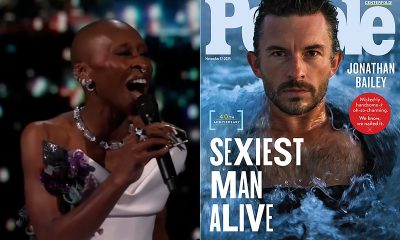Arts & Entertainment
MTV VMAs noms include Hayley Kiyoko, Cardi B
The ceremony airs on Aug. 20


Hayley Kiyoko (Photo via Instagram)
The MTV VMAs announced its 2018 nominations which include big recognition for Cardi B and the Carters.
Cardi B received the most nominations (10) including for Video of the Year, Artist of the Year and Song of the Year. The Carters (Beyonce and Jay-Z) followed close behind with eight nominations for their video “Apeshit.” Childish Gambino and Drake earned seven nominations each, Bruno Mars received six and Ariana Grande and Camila Cabello came in at five nominations.
Lesbian pop singer Hayley Kiyoko also received a VMA nomination for Best New Artist. She will face off against Bazzi, Cardi B, Chloe x Halle, Lil Pump and Lil Uzi Vert.
The VMAs air from Radio City Music Hall on Monday, Aug. 20 at 9 p.m.
See the nominees below.
Video of the Year
Ariana Grande – “No Tears Left To Cry”
Bruno Mars ft. Cardi B – “Finesse (Remix)”
Camila Cabello ft. Young Thug – “Havana”
The Carters – “APESH*T”
Childish Gambino – “This Is America”
Drake – “God’s Plan”
Artist of the Year
Ariana Grande
Bruno Mars
Camila Cabello
Cardi B
Drake
Post Malone
Song of the Year
Bruno Mars ft. Cardi B – “Finesse (Remix)”
Camila Cabello ft. Young Thug – “Havana”
Drake – “God’s Plan”
Dua Lipa – “New Rules”
Ed Sheeran – “Perfect”
Post Malone ft. 21 Savage – “rockstar”
Best New Artist
Bazzi
Cardi B
Chloe x Halle
Hayley Kiyoko
Lil Pump
Lil Uzi Vert
Best Collaboration
Bebe Rexha ft. Florida Georgia Line – “Meant To Be”
Bruno Mars ft. Cardi B – “Finesse (Remix)”
The Carters – “APESH*T”
Jennifer Lopez ft. DJ Khaled & Cardi B – “Dinero”
Logic ft. Alessia Cara & Khalid – “1-800-273-8255”
N.E.R.D & Rihanna – “Lemon”
Push Artist of the Year
July 2018 – Chloe x Halle
June 2018 – Sigrid
May 2018 – Lil Xan
April 2018 – Hayley Kiyoko
March 2018 – Jessie Reyez
February 2018 – Tee Grizzley
January 2018 – Bishop Briggs
December 2017 – Grace VanderWaal
November 2017 – Why Don’t We
October 2017 – PRETTYMUCH
September 2017 – SZA
August 2017 – Kacy Hill
July 2017 – Khalid
June 2017 – Kyle
May 2017 – Noah Cyrus
Best Pop
Ariana Grande – “No Tears Left To Cry”
Camila Cabello ft. Young Thug – “Havana”
Demi Lovato – “Sorry Not Sorry”
Ed Sheeran – “Perfect”
P!nk – “What About Us”
Shawn Mendes – “In My Blood”
Best Hip-Hop
Cardi B ft. 21 Savage – “Bartier Cardi”
The Carters – “APESH*T”
Drake – “God’s Plan”
J. Cole – “ATM”
Migos ft. Drake – “Walk It Talk It”
Nicki Minaj – “Chun-Li”
Best Latin
Daddy Yankee – “Dura”
J Balvin, Willy William – “Mi Gente”
Jennifer Lopez ft. DJ Khaled & Cardi B – “Dinero”
Luis Fonsi, Demi Lovato – “Échame La Culpa”
Maluma – “Felices los 4”
Shakira ft. Maluma – “Chantaje”
Best Dance
Avicii ft. Rita Ora – “Lonely Together”
Calvin Harris & Dua Lipa – “One Kiss”
The Chainsmokers – “Everybody Hates Me”
David Guetta & Sia – “Flames”
Marshmello ft. Khalid – “Silence”
Zedd & Liam Payne – “Get Low (Street Video)”
Best Rock
Fall Out Boy – “Champion”
Foo Fighters – “The Sky Is A Neighborhood”
Imagine Dragons – “Whatever It Takes”
Linkin Park – “One More Light”
Panic! At The Disco – “Say Amen (Saturday Night)”
Thirty Seconds To Mars – “Walk On Water”
Video with a Message
Childish Gambino – “This Is America”
Dej Loaf and Leon Bridges – “Liberated”
Drake – “God’s Plan”
Janelle Monáe – “PYNK”
Jessie Reyez – “Gatekeeper”
Logic ft. Alessia Cara & Khalid – “1-800-273-8255”
Best Cinematography
Alessia Cara – “Growing Pains” – Cinematography by Pau Castejón
Ariana Grande – “No Tears Left To Cry” – Cinematography by Scott Cunningham
The Carters – “APESH*T” – Cinematography by Benoit Debie
Childish Gambino – “This Is America” – Cinematography by Larkin Seiple
Eminem ft. Ed Sheeran – “River” – Cinematography by Frank Mobilio & Patrick Meller
Shawn Mendes – “In My Blood” – Cinematography by Jonathan Sela
Best Direction
The Carters – “APESH*T” – Directed by Ricky Saix
Childish Gambino – “This Is America” – Directed by Hiro Murai
Drake – “God’s Plan” – Directed by Karena Evans
Ed Sheeran – “Perfect” – Directed by Jason Koenig
Justin Timberlake ft. Chris Stapleton – “Say Something” – Directed by Arturo Perez Jr.
Shawn Mendes – “In My Blood” – Directed by Jay Martin
Best Art Direction
The Carters – “APESH*T” – Art Direction by Jan Houlevigue
Childish Gambino – “This Is America” – Art Direction by Jason Kisvarday
J. Cole – “ATM” – Art Direction by Miles Mullin
Janelle Monáe – “Make Me Feel” – Art Direction by Pepper Nguyen
SZA – “The Weekend” – Art Direction by SZA and Solange
Taylor Swift – “Look What You Made Me Do” – Big Machine Records – Art Direction by Brett Hess
Best Visual Effects
Ariana Grande – “No Tears Left To Cry” – Visual Effects by Vidal and Loris Paillier for Buf
Avicii ft. Rita Ora – “Lonely Together” – Visual Effects by KPP
Eminem ft. Beyoncé – “Walk On Water” – Visual Effects Supervisor Rich Lee for Drive Studios
Kendrick Lamar & SZA – “All The Stars” – Visual Effects by Loris Paillier for BUF Paris
Maroon 5 – “Wait” – Visual Effects by TIMBER
Taylor Swift – “Look What You Made Me Do” – Visual Effects by Ingenuity Studios
Best Choreography
Bruno Mars ft. Cardi B – “Finesse (Remix)” – Choreography by Phil Tayag & Bruno Mars
Camila Cabello ft. Young Thug – “Havana” – Choreography by Calvit Hodge and Sara Bivens
The Carters – “APESH*T” – Choreography by Sidi Larbi Cherkaoui and Jaquel Knight
Childish Gambino – “This Is America” – Choreography by Sherrie Silver
Dua Lipa – “IDGAF” – Choreography by Marion Motin
Justin Timberlake – “Filthy” – Choreography by Marty Kudelka, AJ Harpold, Tracy Phillips and Ivan Koumaev
Best Editing
Bruno Mars ft. Cardi B – “Finesse (Remix)”– Editing by Jacquelyn London
The Carters – “APESH*T” – Taylor Ward and Sam Ostrove
Childish Gambino – “This Is America” – Editing by Ernie Gilbert
Janelle Monáe – “Make Me Feel” – Editing by Deji Laray
N.E.R.D & Rihanna – “Lemon” – Editing by Taylor Ward
Taylor Swift – “Look What You Made Me Do” – Editing by Chancler Haynes for Cosmo
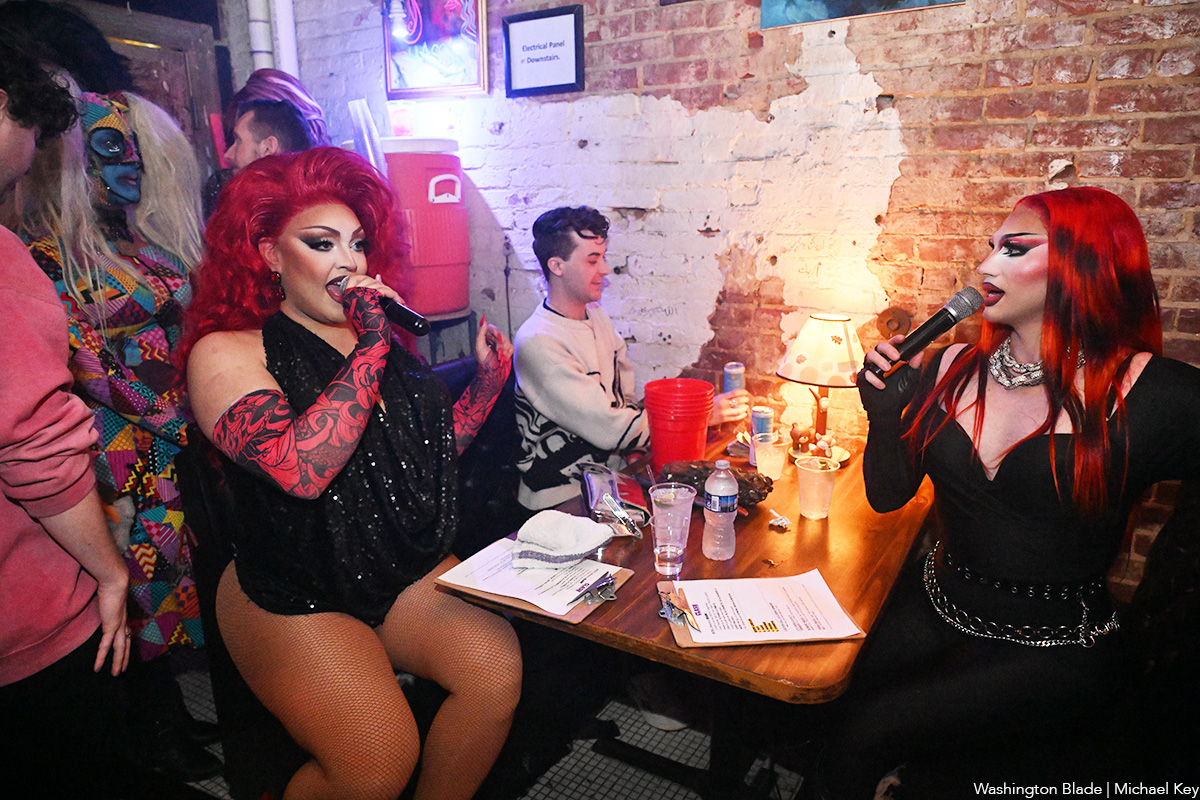
Crimsyn and Tatianna hosted the new weekly drag show Clash at Trade (1410 14th Street, N.W.) on Feb. 14, 2026. Performers included Aave, Crimsyn, Desiree Dik, and Tatianna.
(Washington Blade photos by Michael Key)
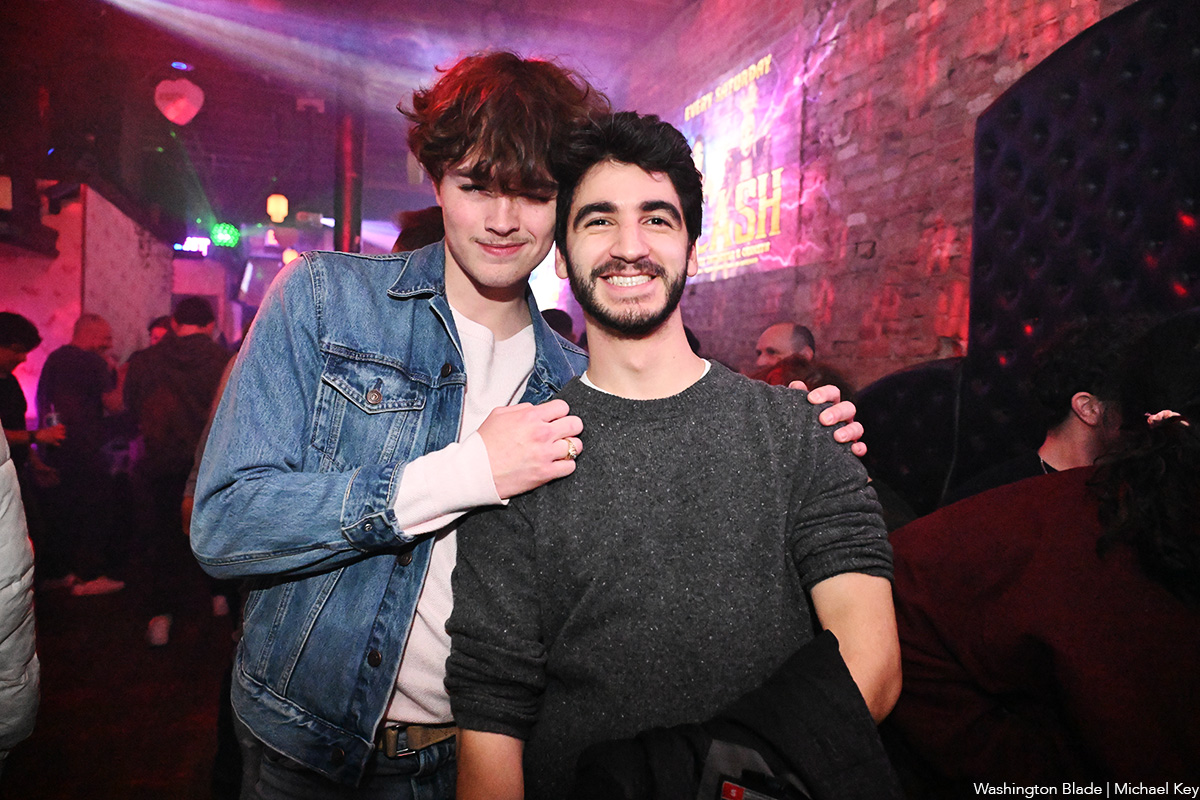
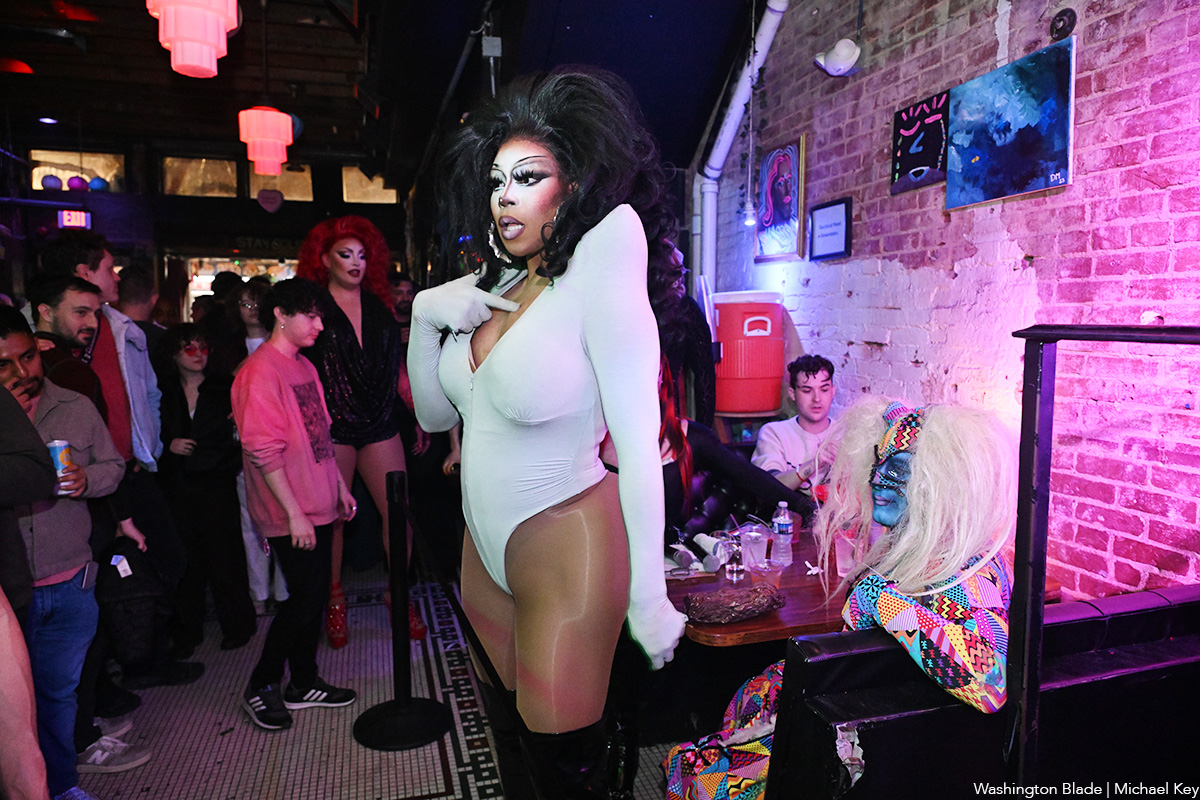
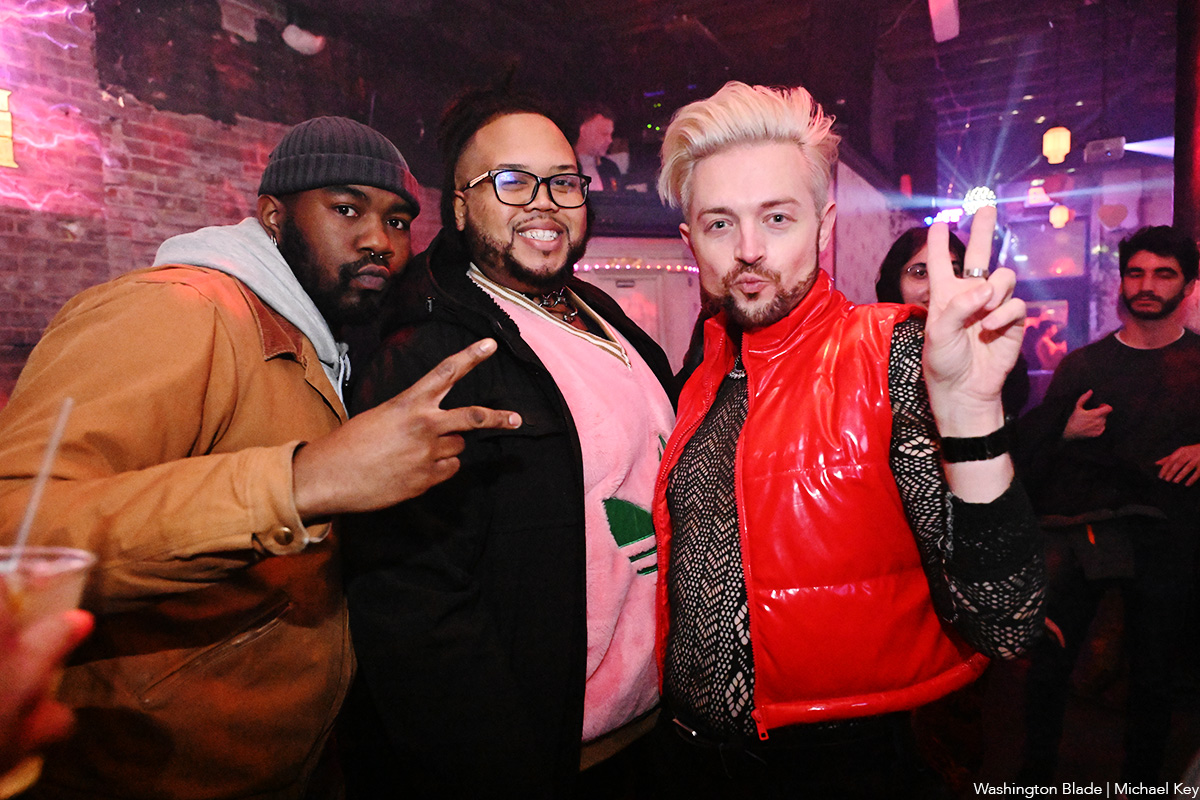



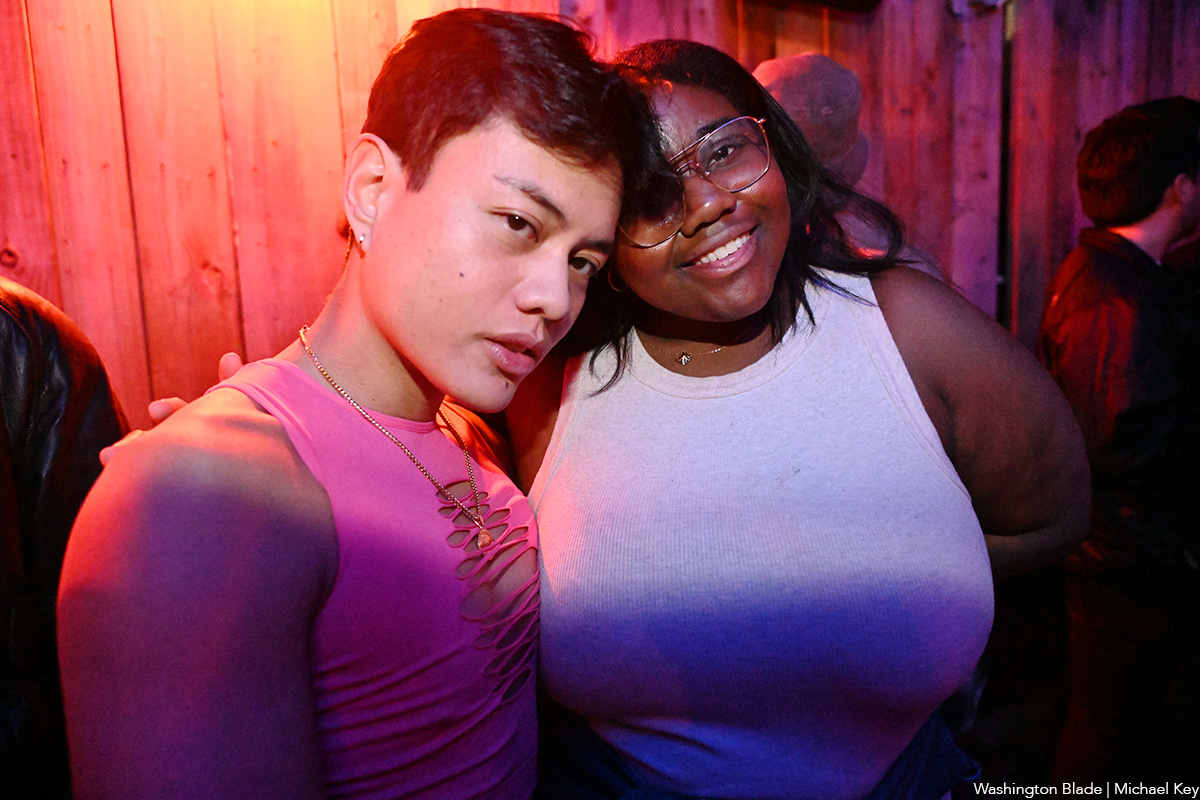
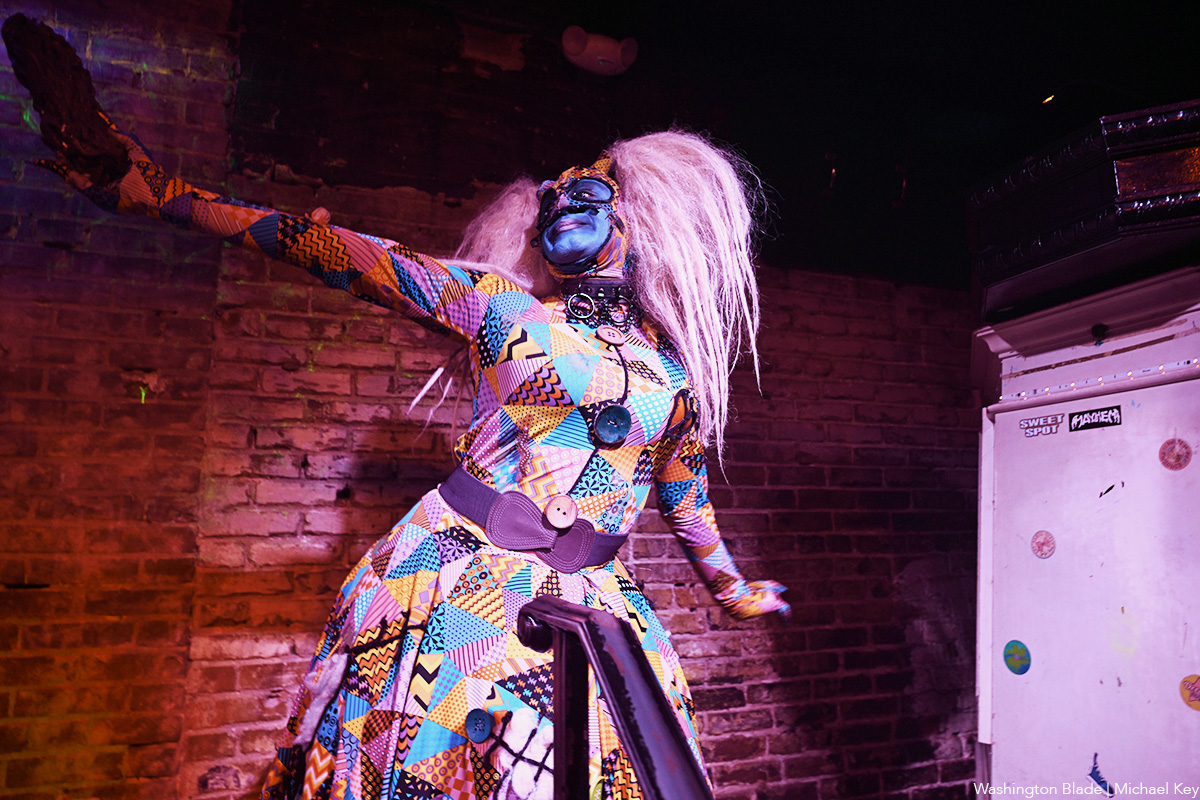




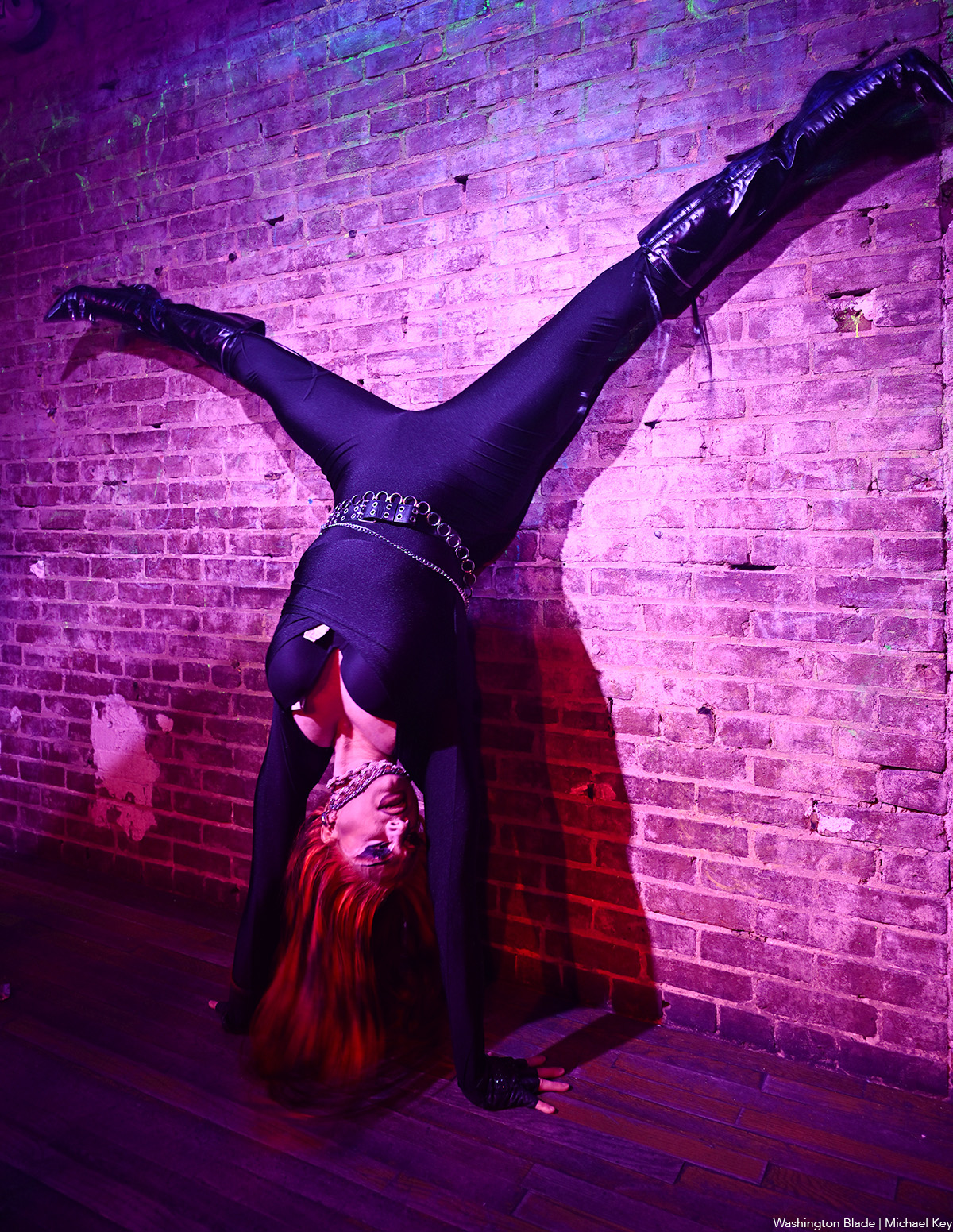
Theater
Magic is happening for Round House’s out stage manager
Carrie Edick talks long hours, intricacies of ‘Nothing Up My Sleeve’

‘Nothing Up My Sleeve’
Through March 15
Round House Theatre
4545 East-West Highway
Bethesda, Md. 20814
Tickets start at $50
Roundhousetheatre.org
Magic is happening for out stage manager Carrie Edick.
Working on Round House Theatre’s production of “Nothing Up My Sleeve,” Edick quickly learned the ways of magicians, their tricks, and all about the code of honor among those who are privy to their secrets.
The trick-filled, one-man show starring master illusionist Dendy and staged by celebrated director Aaron Posner, is part exciting magic act and part deeply personal journey. The new work promises “captivating storytelling, audience interaction, jaw-dropping tricks, and mind-bending surprises.”
Early in rehearsals, there was talk of signing a non-disclosure agreement (NDA) for production assistants. It didn’t happen, and it wasn’t necessary, explains Edick, 26. “By not having an NDA, Dendy shows a lot of trust in us, and that makes me want to keep the secrets even more.
“Magic is Dendy’s livelihood. He’s sharing a lot and trusting a lot; in return we do the best we can to support him and a large part of that includes keeping his secrets.”
As a production assistant (think assistant stage manager), Edick strives to make things move as smoothly as possible. While she acknowledges perfection is impossible and theater is about storytelling, her pursuit of exactness involves countless checklists and triple checks, again and again. Six day weeks and long hours are common. Stage managers are the first to arrive and last to leave.
This season has been a lot about learning, adds Edick. With “The Inheritance” at Round House (a 22-week long contract), she learned how to do a show in rep which meant changing from Part One to Part Two very quickly; “In Clay” at Signature Theatre introduced her to pottery; and now with “Nothing Up My Sleeve,” she’s undergoing a crash course in magic.
She compares her career to a never-ending education: “Stage managers possess a broad skillset and that makes us that much more malleable and ready to attack the next project. With some productions it hurts my heart a little bit to let it go, but usually I’m ready for something new.”
For Edick, theater is community. (Growing up in Maryland, she was a shy kid whose parents signed her up for theater classes.) Now that community is the DMV theater scene and she considers Round House her artistic home. It’s where she works in different capacities, and it’s the venue in which she and actor/playwright Olivia Luzquinos chose to be married in 2024.
Edick came out in middle school around the time of her bat mitzvah. It’s also around the same time she began stage managing. Throughout high school she was the resident stage manager for student productions, and also successfully participated in county and statewide stage management competitions which led to a scholarship at the University of Maryland, Baltimore County (UMBC) where she focused on technical theater studies.
Edick has always been clear about what she wants. At an early age she mapped out a theater trajectory. Her first professional gig was “Tuesdays with Morrie” at Theatre J in 2021. She’s worked consistently ever since.
Stage managing pays the bills but her resume also includes directing and intimacy choreography (a creative and technical process for creating physical and emotional intimacy on stage). She names Pulitzer Prize winning lesbian playwright Paula Vogel among her favorite artists, and places intimacy choreographing Vogel’s “How I learned to Drive” high on the artistic bucket list.
“To me that play is heightened art that has to do with a lot of triggering content that can be made very beautiful while being built to make you feel uncomfortable; it’s what I love about theater.”
For now, “Nothing Up My Sleeve” keeps Edick more than busy: “For one magic trick, we have to set up 100 needles.”
Ultimately, she says “For stage managers, the show should stay the same each night. What changes are audiences and the energy they bring.”

Friday, February 13
Center Aging Monthly Luncheon With Yoga will be at noon at the DC Center for the LGBT Community. Email Mac at [email protected] if you require ASL interpreter assistance, have any dietary restrictions, or questions about this event.
Go Gay DC will host “LGBTQ+ Community Happy Hour Meetup” at 7 p.m. at Freddie’s Beach Bar and Restaurant. This is a chance to relax, make new friends, and enjoy happy hour specials at this classic retro venue. Attendance is free and more details are available on Eventbrite.
Women in their Twenties and Thirties will be at 7 p.m. on Zoom. This is a social discussion group for queer women in the D.C. area. For more details, visit the group on Facebook.
Saturday, February 14
Go Gay DC will host “LGBTQ+ Community Brunch” at 11 a.m. at Freddie’s Beach Bar & Restaurant. This fun weekly event brings the DMV area LGBTQ community, including allies, together for delicious food and conversation. Attendance is free and more details are available on Eventbrite.
The DC Center for the LGBT Community will host a screening of “Love and Pride” at 1:30 p.m. This event is a joy-filled global streaming celebration honoring queer courage, Pride, and the power of love. It’s a bold celebration of courage and community — a fearless reminder of what we’ve overcome, how love is what makes us unstoppable, and how we have always turned fear into fierce. For more details, visit the Center’s website.
Sunday, February 15
LGBTQ+ Community Coffee and Conversation will be at 12 p.m. at As You Are. This event is for people looking to make more friends and meaningful connections in the LGBTQ community. Attendance is free and more details are available on Eventbrite.
Monday, February 16
Queer Book Club will be at 7:00p.m. on Zoom. This month’s read is “Faebound” by Saara El-Arifi. For more details, visit the DC Center’s website.
“Center Aging: Monday Coffee Klatch” will be at 10 a.m. on Zoom. This is a social hour for older LGBTQ+ adults. Guests are encouraged to bring a beverage of choice. For more information, contact Adam ([email protected]).
Tuesday, February 17
Center Bi+ Roundtable will be at 7 p.m. on Zoom. This is an opportunity for people to gather in order to discuss issues related to bisexuality or as Bi individuals in a private setting.Visit Facebook or Meetup for more information.
Wednesday, February 18
Job Club will be at 6 p.m. on Zoom upon request. This is a weekly job support program to help job entrants and seekers, including the long-term unemployed, improve self-confidence, motivation, resilience and productivity for effective job searches and networking — allowing participants to move away from being merely “applicants” toward being “candidates.” For more information, email [email protected] or visit thedccenter.org/careers.
Thursday, February 19
The DC Center’s Fresh Produce Program will be held all day at the DC Center for the LGBT Community. To be fair with who is receiving boxes, the program is moving to a lottery system. People will be informed on Wednesday at 5 p.m. if they are picked to receive a produce box. No proof of residency or income is required. For more information, email [email protected] or call 202-682-2245.
Virtual Yoga Class will be at 7 p.m. on Zoom. This free weekly class is a combination of yoga, breath work and meditation that allows LGBTQ+ community members to continue their healing journey with somatic and mindfulness practices. For more details, visit the DC Center’s website.

